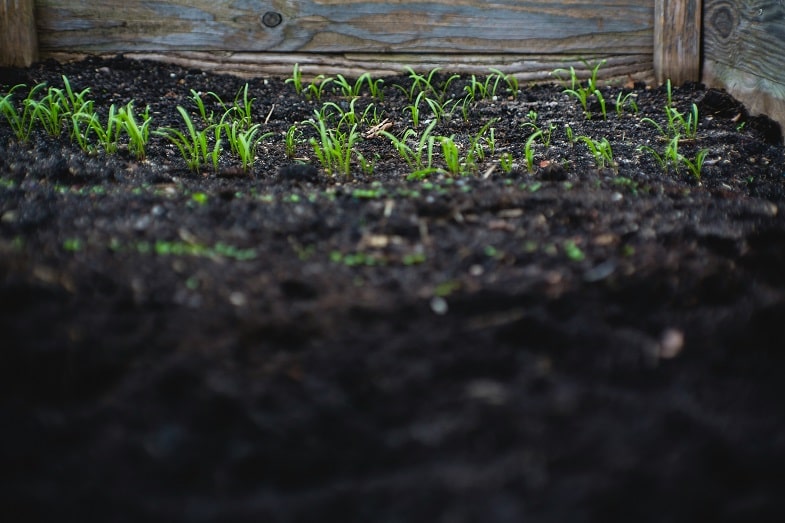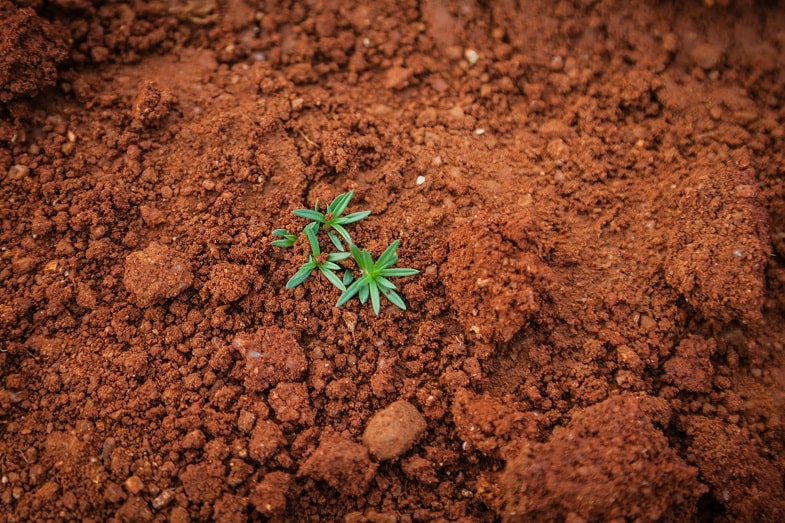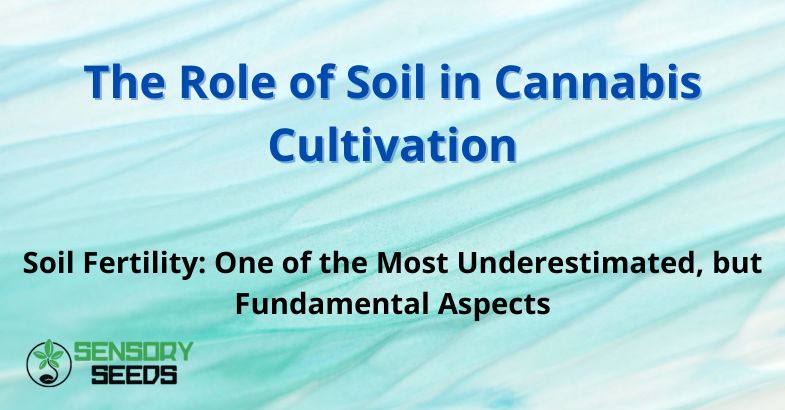Modified on: 22/07/2025
Soil Fertility: One of the Most Underestimated, but Fundamental Aspects
Often, people believe that the quality of plants depends only on cultivation techniques or the growth environment, but in reality, the soil represents the foundation from which everything starts. Healthy soil is not just a substrate where plants sink their roots; it is a living ecosystem capable of nourishing and supporting the lush growth of plants.
A fertile and balanced soil provides cannabis plants with essential nutrients, allowing cannabis seeds to become healthy and robust plants. It is important to understand that cannabis, like any other plant, is highly dependent on soil health for its well-being and ability to produce high-quality flowers. But how can you maintain healthy and fertile soil?
The Principles of Soil Fertility
Soil fertility can be defined as the soil’s ability to provide plants with all the necessary nutrients for their growth, in optimal quantities and proportions. However, this is not a static characteristic, but one influenced by a series of chemical, physical, and biological factors. Among these factors are:
- Soil structure: structure refers to the physical arrangement of soil particles, such as sand, silt, and clay, and the balance between them. Well-structured soil has a good capacity to retain water, proper aeration, and an optimal balance between drainage and water retention. Conversely, compacted soils limit root penetration and hinder the correct development of plants.
- Nutrients and organic matter: the fundamental nutrients for cannabis include nitrogen (N), phosphorus (P), potassium (K), along with micronutrients like calcium, magnesium, and iron. Soil rich in organic matter provides a natural reserve of nutrients, which are gradually released during the plant’s growth cycle.
- Soil pH: the level of soil acidity or alkalinity directly affects the plants’ ability to absorb nutrients. The ideal pH for cannabis cultivation generally ranges between 6 and 7, with slight variations based on environmental conditions and the type of strain grown.
- Biological activity: healthy soil hosts a wide range of organisms, from bacteria and fungi to earthworms. These organisms play a crucial role in maintaining soil fertility by decomposing organic matter and releasing essential nutrients that plants can absorb.
Read also: Everything you need to know about cannabis breeding and its evolution


Soil Structure
One of the most important elements of soil fertility is its structure, which determines how well the soil retains water and provides aeration for the roots. Cannabis plants need a good balance between drainage and water retention since both excessive moisture and drought can harm them.
Well-structured soil promotes root development, allowing plants to explore a wide area of soil to absorb nutrients and water. In contrast, excessively compact or clayey soils can hinder root growth, limiting access to nutrients. To avoid this issue, it’s essential to improve soil structure by using techniques like adding organic matter, compost, and natural amendments.
For example, adding compost not only improves soil structure but also increases its moisture retention capacity and promotes the proliferation of beneficial microorganisms. Additionally, compost helps create friable soil that facilitates root oxygenation and prevents compaction.
Essential Nutrients for Cannabis: Nitrogen, Phosphorus, and Potassium
To grow strong and productive cannabis plants, the soil must contain a balanced amount of nutrients. The main macronutrients cannabis requires are:
- Nitrogen (N): essential for vegetative growth, nitrogen stimulates leaf and branch development. A nitrogen deficiency can cause yellowing leaves and stunted growth, while an excess can delay flowering.
- Phosphorus (P): phosphorus is crucial for root development and flowering. An insufficient supply of phosphorus can compromise flower production, reducing both quality and overall yield.
- Potassium (K): potassium plays a crucial role in plant metabolism, helping to resist diseases and environmental stress. It also promotes abundant flowering and the formation of dense, resinous buds.
In addition to these macronutrients, cannabis plants need various micronutrients such as calcium, magnesium, and iron, which help regulate various physiological functions. To ensure the soil provides all the necessary nutrients, it’s advisable to enrich it with organic fertilizers or products specifically designed for cannabis cultivation. However, nutrient concentrations must be monitored to avoid overdoses, which can be toxic to the plants.
Soil pH: Why Is It So Important?
Soil pH is a critical factor that directly affects the availability of nutrients to plants. Soil that is too acidic or too alkaline can make it difficult for cannabis to absorb essential nutrients, even if they are present in sufficient quantities. The ideal pH for cannabis generally ranges between 6 and 7, a range in which most nutrients are easily accessible.
If the soil’s pH is too low (acidic), nutrients like phosphorus and calcium can become insoluble, while a high pH (alkaline) can block the absorption of micronutrients such as iron and manganese. To maintain a stable pH, amendments like agricultural lime can be used to raise pH or sulfur to lower it, depending on the needs.
Regular pH monitoring is essential to ensure that cannabis plants can absorb all the nutrients they need. Tools like soil pH meters or home testing kits are useful for keeping the soil’s pH under control and making necessary adjustments.


The Life Cycle of Soil Microorganisms
Fertile and healthy soil hosts a wide range of living organisms, including bacteria, fungi, algae, and earthworms. These microorganisms play a crucial role in decomposing organic matter and releasing nutrients available to plants. Among the most important microorganisms are nitrogen-fixing bacteria, which convert atmospheric nitrogen into forms usable by plants.
Mycorrhizal fungi, on the other hand, establish symbiotic relationships with plant roots, helping them absorb phosphorus and other nutrients from the soil. In return, plants provide fungi with sugars and carbohydrates produced during photosynthesis. This mutual interaction is essential for cannabis growth, as it allows greater access to nutrients and improves the plant’s resistance to stress conditions.
To maintain high biological activity in the soil, it’s important to avoid the excessive use of pesticides and chemical fertilizers, which can harm these beneficial organisms. Techniques like crop rotation and the addition of compost help maintain a healthy population of microorganisms in the soil.
Read also: Microelement deficiency in cannabis plants: how it is recognised and what remedies are applied
Soil Drainage: Preventing Stagnation Issues
Drainage is another key aspect of cannabis cultivation, as poorly drained soil can lead to waterlogging, causing root rot and preventing roots from absorbing oxygen. Cannabis prefers well-drained soil, allowing roots to breathe and grow freely.
To improve drainage and cannabis seed germination, amendments such as perlite or coarse sand can be used, increasing soil porosity. However, it is equally important not to overdo it with these materials, as excessive drainage can reduce the soil’s ability to retain moisture, causing water stress for the plants.
Conclusion
Soil health is essential for successful cannabis cultivation. Fertile soil, rich in organic matter and well-balanced in nutrients, provides plants with the ideal conditions to grow strong and lush. Sustainable soil management, through practices such as pH control, not only improves cannabis yields but also contributes to the conservation of the ecosystem on which agriculture depends. By constantly paying attention to soil fertility and balancing its components, high-quality cannabis production can be achieved while respecting the environment and plant health.
For exceptional cannabis cultivation, start with the best seeds! At SensorySeeds, we offer premium cannabis seeds that thrive in fertile, well-balanced soil. Whether you’re an expert grower or just starting out, our high-quality seeds ensure a successful harvest. Enhance your soil’s health and boost your yields with our wide selection.
Visit our shop now and cultivate excellence from the ground up!









